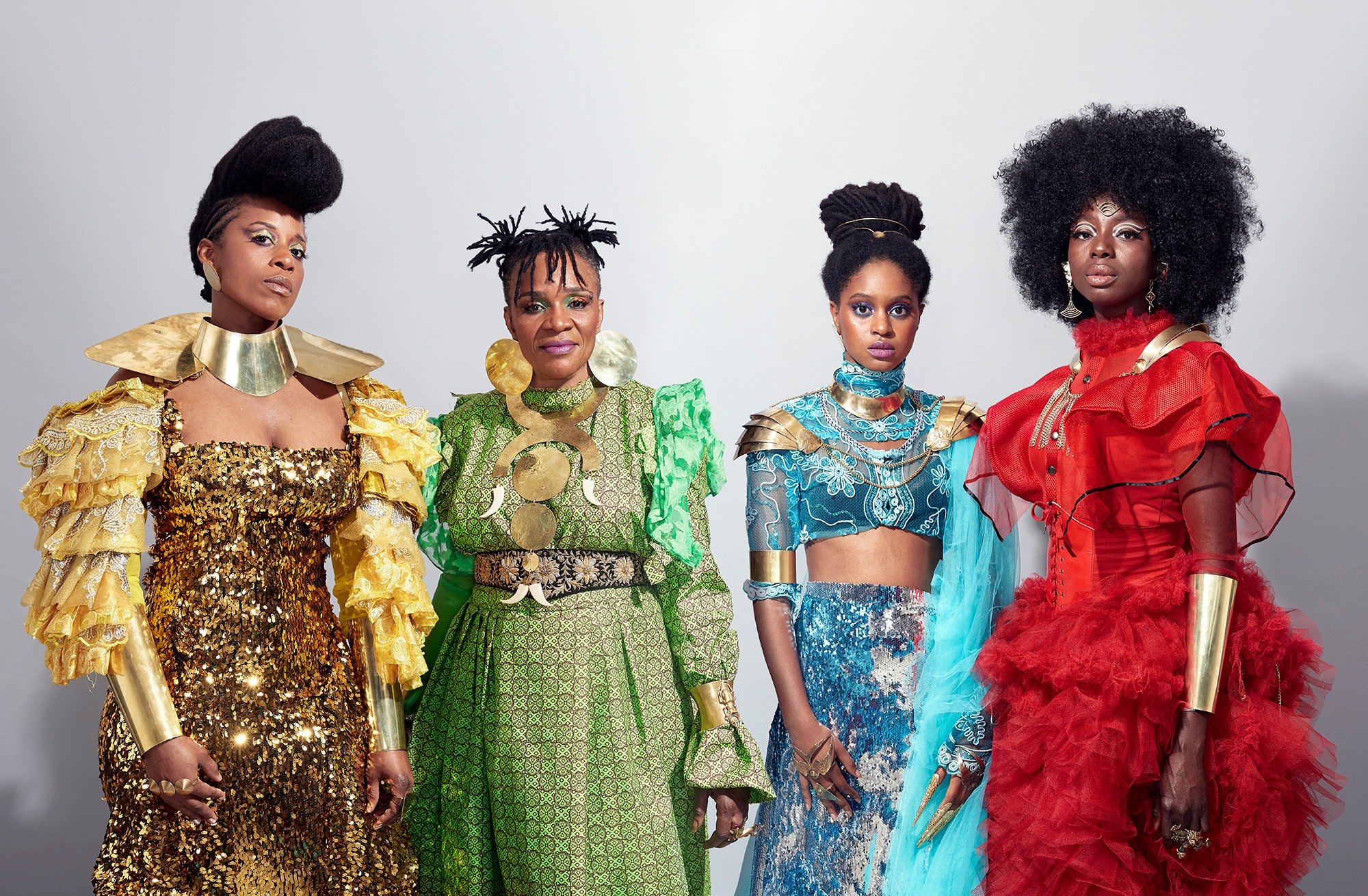Global Beat: Les Amazones d’Afrique

The supergroup charting Africa’s future returns for another round that bridges the gap between generations, genders and genres.
According to producer Liam Farrell, “less ethnomusicology and more reality” was the musical mandate for Amazones Power, the second album of feminist Afrofuturism by Les Amazones d’Afrique. An evolving collective of great African singers, Les Amazones originally assembled in 2014 for a conversation between Mamani Keïta, Oumou Sangaré, Mariam Doumbia (of Amadou & Mariam) and French manager/booker Valérie Malot, whose African musical explorations continue with her husband, the tenor saxophone giant David Murray.
Les Amazones’ debut album for Peter Gabriel’s Real World Records, République Amazone, was relatively rooted in traditionalism. It featured 10 venerable vocalists from Mali, Benin and Nigeria—including Angélique Kidjo, Rokia Koné and Kandia Kouyaté. (The group’s name refers to a historical female military regiment in what is now Benin.) The album was a success: Nigerian singer Nneka’s self-respect anthem, “La Dame et Ses Valises,” even ended up on Barack Obama’s end-of-year playlist for 2017.
While the debut LP focused on strength and solidarity, Amazones Power is a more formidably assertive vehicle. Its core issues include female genital mutilation—the partial or total removal of the external female genitalia—sexual identity, forced marriage and misogyny.
Keïta returns to address FGM directly in “Love”—which condemns the ceremonial aspects of circumcision ceremonies that are intended to screen the procedure’s harsh realities—over beats, congas and a dire electronic bass line.
As French-Guinean singer and Amazones newcomer Niariu explains, such ceremonies are occurring less often. “My mother tried her best not to make us go through the trauma she went through,” says the 24-year-old singer. “It’s a taboo subject. It’s not something you talk about, just something you experience, or not. These ceremonies are part of our past.”
The politically active Niariu, who is a Muslim member of West Africa’s large Fulani community, was born in France. On the slow-grooving “Smile,” one of her two solo tracks on Amazones Power, Niariu addresses both the generational trauma and the strong yet pernicious role gossip has played in shaping the identities of African women.
Niariu admits that gossip “is a way of living” among West Africans. Where Westerners glorify their individualism, African culture is a more collective experience. “All this gossiping affects your personal life, your work, your marriage, your children,” she says. “It can be really damaging.” But, as Koné—Mali’s affectionately regarded “Rose of Bamako”— sings over Farrell’s synth blasts in “Queens,” African women are subjugated in many other ways, too: abusive husbands, jealous co-wives, nasty in-laws.
Do these old problems have new solutions? Niariu sees Les Amazones as a way to publicly discuss delicate subjects impacting the African community. But it’s difficult, she says, to make the case for banning traditions that harm women, such as FGM, without offending traditionally minded older women. “It’s important and complicated,” she says, “because they have to know we’re not against them, or trying to portray them as barbaric.” At the end of the day, however, “Women have always been role models for me more than men. My mother, my sisters, my aunties—that’s who’s important for me.”
Musically, Liam Farrell—or Doctor L, as he’s known in the production world—relished the opportunity to turn up the new on Amazones Power. On République Amazone, he says, “I was using recycled stuff we recorded with traditional instruments, and producing around that. Half of this one, though, is just me doing tracks for them. There’s not anything especially African about a lot of them.”
Farrell wonders what “African” means in a world where the latest Nigerian pop music is a brash and increasingly ubiquitous commercial bridge between certain parts of the continent and the rest of the world. Rather than layer vocals over traditional African rhythms, he creates futuristic sonic nests, redolent of dub, hiphop, and his own mad blend of punky electronics and distorted percussion.
His work with Les Amazones is an internationalist expression of his long-standing, big-eared take on modern African music. On the band Mbongwana Star’s 2015 debut, From Kinshasa, Farrell successfully blended bubbly Congolese rumba and soukous guitar riffs with the abrasively processed sparecar-parts percussion of Kinshasa street musicians.
Mbongwana Star has now disbanded, according to Farrell, but you can hear a similar invigoratingly spooky mix of high and low techs in Bantou Mentale. Part of the Congolese scene arising in Paris’ banlieues, Bantou joins elements of Mbongwana Star and Staff Benda Bilili, both of which featured drummercomposer Cubain Kabeya and mono-monikered singer Apocalypse. “They live in poor Paris neighborhoods,” Farrell says. “It’s a working-class thing, like the explosion that occurred when Jamaicans and punks mixed” in England during the late ‘70s. “This is the new immigration generation.”
While raw rock music has long been part of Africa’s musical DNA, it was, unfortunately, never the part that was marketed to the rest of the world. You can hear it on Amazones Power, though, especially on Koné’s festive “Red,” which features Sountoucoumba “Salif” Koné’s searing guitar squall.
In fact, the only time Amazones Power verges on cliché is during the group sing-along “Power.” Otherwise, it resembles an ongoing, and increasingly exciting, reconciliation movement between generations, genders and musical traditions




















